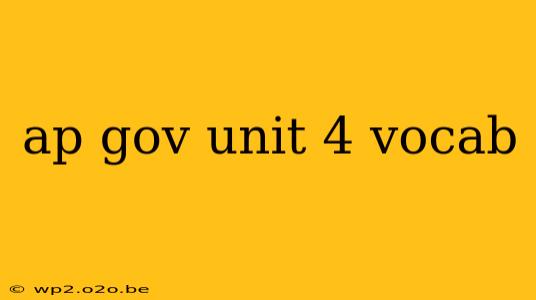Unit 4 of AP Government and Politics often delves into the complex world of the federal bureaucracy. Understanding the key vocabulary is crucial for success. This guide provides definitions and context for essential terms, helping you navigate this challenging yet fascinating unit.
Key Terms and Concepts: Understanding the Federal Bureaucracy
The federal bureaucracy, a system of government departments and agencies, plays a vital role in implementing and enforcing laws. Mastering the following terms will solidify your understanding of its structure and function:
1. Bureaucracy:
A large, complex organization composed of appointed officials. This is the core concept of the unit, encompassing all the other terms. Understanding the bureaucracy's structure, its interaction with other branches of government (checks and balances!), and its impact on policy implementation is paramount.
2. Cabinet Departments:
The fifteen major administrative units with responsibility for a broad area of government operations. These are the biggest players, each with a secretary (appointed by the President and confirmed by the Senate) at its head. Examples include the Department of Defense, Department of Justice, and Department of Health and Human Services. Understanding their specific jurisdictions is key.
3. Independent Executive Agencies:
Government agencies that exist outside the cabinet departments. They report directly to the President but possess a greater degree of autonomy compared to cabinet departments. Examples include the Environmental Protection Agency (EPA), the Central Intelligence Agency (CIA), and NASA. Knowing what distinguishes them from cabinet departments is critical.
4. Independent Regulatory Commissions:
Agencies created by Congress to regulate specific sectors of the economy. These are designed to be insulated from partisan politics, often with members appointed for staggered terms. Examples include the Federal Reserve (the Fed), the Federal Communications Commission (FCC), and the Securities and Exchange Commission (SEC). Their role in regulating the private sector is crucial to understand.
5. Government Corporations:
Businesses established by Congress to perform functions that could be provided by the private sector but are often deemed essential for public welfare. These often operate at a profit, but their primary function is to serve public purposes. Examples include the United States Postal Service (USPS) and Amtrak. Understanding their unique position as both businesses and government entities is important.
6. Patronage (Spoils System):
The practice of rewarding loyal party members with government positions. While largely replaced by the merit system, understanding its historical impact and lingering effects is crucial. It is important to contrast this with the modern merit system.
7. Merit System:
A system of employment based on qualifications, skills, and performance rather than political connections. This contrasts sharply with patronage and is central to the modern functioning of the bureaucracy. Understanding its strengths and limitations is important.
8. Civil Servants:
Employees of the federal government who are hired through the merit system. These are the individuals who make up the day-to-day workings of the bureaucracy. Knowing their role in implementing policy is crucial.
9. Administrative Discretion:
The authority given to bureaucrats to make decisions and implement policies within the bounds of law. This flexibility is both a source of strength and potential for abuse. Understanding its implications is crucial.
Expanding Your Understanding
This vocabulary list provides a foundational understanding of key terms. To truly master Unit 4, you should:
- Examine specific examples: Deeply investigate the functions and powers of several agencies from each category listed above.
- Analyze case studies: How have bureaucratic agencies impacted policy decisions? Consider examples of successes and failures.
- Understand the interaction between branches: How do Congress, the President, and the Courts influence the bureaucracy?
By mastering this vocabulary and exploring the concepts in greater depth, you will significantly enhance your understanding of the federal bureaucracy and improve your performance on the AP Government and Politics exam. Remember to consult your textbook and class materials for a more comprehensive overview.

